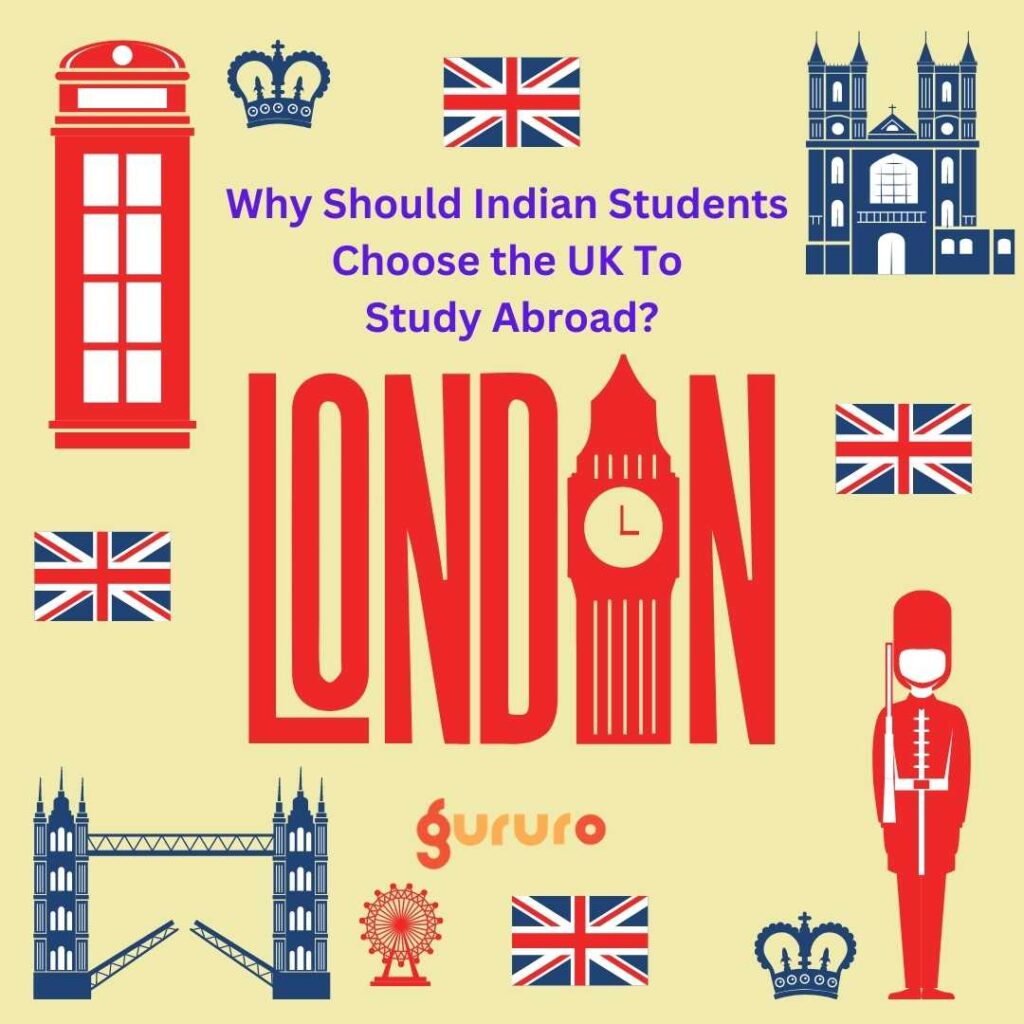Table of Contents
Introduction
The United Kingdom (UK) is home to some of the oldest colleges and institutions in the world, some of which date back to the 12th and 13th centuries. With such a rich history, education in the UK has set a standard for other nations. Numerous countries worldwide now host hundreds of thousands of Indian students studying abroad, and more students are joining them yearly! Each year, the UK attracts hundreds of thousands of foreign students. Naturally, a large share of university students in the UK is from the Indian subcontinent. Although India has several institutions and schools offering top-notch degrees in various subjects, studying in a nation like the United Kingdom is undoubtedly a once-in-a-lifetime experience. So continue reading to learn Why Should Indian Students Choose The UK To Study Abroad.
Top institutions present in the UK
University of Oxford : Founded in 1096
Oxford, England’s The Institution of Oxford is a college research university. It is often known as Oxford University. Although there is no record of its founding, there is evidence that classes were held as early as 1096, making it the second-oldest surviving university in the world and the oldest institution in the English-speaking world. The University comprises numerous organizations, including 38 member colleges and a wide range of academic departments divided into four Divisions. Each college, a part of the university, has its internal structure and activities and regulates its membership and operations. Because it is a city university, all the buildings and amenities are dispersed around the metropolitan area; there is no central campus.
Admission requires:
- Undergraduate: A level: Depending on the subject, conditional offers for students pursuing A-levels will fall between the grades of A*A*A and AAA. Internationally qualified candidates must adhere to a 15.
University of Cambridge : Founded in 1209
The University of Cambridge (often known as Cambridge University), which is situated in Cambridge, England, is the second-oldest university in the English-speaking world and is known for being among the most distinguished institutions in the entire globe. There are 31 colleges at the university. The places where students live, eat, and socialize are colleges. They are also in charge of providing spiritual care and paying for each student’s tuition.
Admission requires:
- A-A* at the undergraduate level; Undergraduate applicants are not allowed to apply to both Oxford and Cambridge in the same year to allow for a more individualized evaluation of students who may otherwise apply for both.
- Postgraduate: Completion of, or release from, any ongoing training or education course; and at least a 2i honors degree from a UK institution or an equal standard from an overseas university.
October deadline, as must those applying to the University of Oxford and for the fields of medicine and dentistry. Undergraduate applicants are not allowed to apply to both Oxford and Cambridge in the same year to allow for a more individualized evaluation of students who may otherwise apply for both.
- Postgraduate: Generally, a first-class undergraduate degree from the United Kingdom correlates to a US GPA of 3.7 using the 4.0 scale, which is the minimum required for your selected course. This is roughly similar to a US GPA of 3.5 for courses requiring a high second-class degree (first division) from the UK. Please contact the department directly to determine your eligibility if you don’t meet the minimum requirements or aren’t sure if you qualify to submit a competitive application.
Imperial College London : Founded in 1907
Imperial College London is a public research university focusing on business, engineering, medicine, and science. It is located in London. In 2003, the Imperial College Business School was founded. Over 40 departments, institutes, and research centers are housed within Imperial’s four main faculties. Thirteen thousand five hundred students and 3,330 academic and research staff attend Imperial.
Admission requires:
- Undergraduate: Imperial is one of the UK’s most exclusive universities. The overall acceptance rate to degree programs has consistently been below 20%, and, in 2009, the acceptance rate for postgraduates was 19.5% and 15.3% for undergraduates. Imperial was among the first universities in the UK to use the A* grade at A Level for admissions, with engineering and physics courses requiring an A* in Mathematics. Imperial joined University College London and the University of Cambridge as other institutions that first used the A* grade at A Level for admissions.
Imperial announced in 2008 that it was exploring the possibility of entrance exams to help select the most suitable students. Since then, Imperial has been reviewing and piloting various assessment approaches, such as subject-specific tests, skill tests, and motivation-based tests as part of enhanced interviews. The BMAT is already used in the selection process by the Faculty of Medicine.
- Postgraduate: First or high Upper Second Class UK honors degrees, or their equivalents from other countries, are typically required of applicants for taught Master’s programs.
London School of Economics and Political Science: Founded in 1895
The London School of Economics and Political Science (more commonly known as the London School of Economics or LSE) is a constituent institution of the federal University of London and a public research university focusing on the social sciences. LSE became a member of the University of London in 1900 and began awarding degrees to students in 1902. Despite its name, LSE also conducts research and teaching in several other fields, including arithmetic, statistics, philosophy, and history. Historically known as Clare Market, LSE is situated in Westminster, central London, close to the line separating Covent Garden and Holborn. It has little over 3,000 employees and about 9,500 full-time students. There are 24 academic departments and 19 research centers in the school. Over 4 million print volumes, 60,000 online journals, and 29,000 electronic books are housed at the British Library of Political and Economic Science at LSE. The LSE is a premier institution that specializes in social sciences. LSE was ranked second in social sciences and management and fourth for employer reputation in the 2013 QS World University Rankings. LSE ranked 24th in the 2014 World Reputation Ranking published by The Times Higher Education.
Admission requires:
- Undergraduate: It’s difficult to get into LSE. For 1,200 undergraduate spots, the school got 17,500 applicants in 2012. Given that undergraduate students are only allowed to apply to a maximum of five universities, there were roughly 14.6 applications per available spot, making LSE one of the institutions with the lowest admittance rates worldwide. Most programs typically give A*A*A-AAA at A level, and new undergraduates coming in 2013 had an average UCAS score of 551 points (equivalent to over AAAA at A level).
- Postgraduate:
N/A
This was the list of some of the top universities present in the UK. Many prestigious institutions are present in the region, but those mentioned above are the most anticipated universities.
Education system India v/s the UK.
- Education standard: The education provided by the Indian educational system falls short of that of the UK. Government schools are in inferior condition and have less qualified teachers. Even though attempts have been made consistently to improve the state of education, much more has to be done.
- Technology in education: When it comes to technology, the UK education system is cutting edge. For instance, the students are given online notes, unlike the traditional notes-keeping approach in India. Projectors and educational software use are increasingly widespread in the UK’s educational system. However, there aren’t many schools in India with modern amenities, and there aren’t many in the countryside either.
- Alternatives: Several subject options are available to students in the UK education system, particularly for higher education. For example, there may not be as many course possibilities in Indian institutions as in colleges with a UK presence if you wish to pursue a career in the arts or theatre.
- Infrastructure: A sound infrastructure is necessary for a sound educational system. India’s infrastructure quality has improved compared to the UK educational system but still falls short on several fronts. Additionally, many Indian schools, particularly rural ones, lack modern amenities like smart classrooms, well-equipped laboratories, and other features.
- Possibility to build skills: In India, the emphasis is on teaching pupils the skills necessary to perform well on exams. Students in the UK are given assignments that call for in-depth investigation and aid in skill management. Although this does not imply that Indian students lack talents, there are fewer opportunities here.
It wouldn’t be entirely incorrect to state that the education system in the UK is a little more advanced and superior to that in India. To raise the standard of education provided in the nation, there are
many things that the Indian educational system can learn and use. On the other hand, the UK school system can be a little stressful because there is less time allotted for studying there than in other countries. The students must also decide what they want to be at a very young age, and you are not free to modify your selections.
Career and Growth Opportunities
With 32.4 million people in the workforce, the UK has the 6th largest economy in the world. Many international students intend to stay in the UK after their studies because the nation boasts an employment rate of over 75%. Over 538,000 ambitious overseas students are enrolled in the UK educational system as of 2019–20, according to figures given by HESA (Higher Education Statistics Agency).
India is the second most popular nation for students enrolling in UK higher education institutions.
Can International Students Work in the UK After Earning a Master's Degree?
As with a Tier 4 student visa, you must apply for a Tier 2 (general) work visa if you wish to remain in the UK and find admissible employment with an approved employer. You must submit a Tier 1 visa application if you want to launch a business in the UK. You have five years left on your work permit to develop your future and plan to remain in the UK permanently.
Following a Masters's degree, there are several job opportunities in the UK.
Now that we know that UK international students are qualified for employment, let’s look at the top sectors. Here are some of the most sought-after courses in the UK, together with information on degree requirements, average salaries, and top employers:
Engineering:
- Requirements for degrees: MEng in Civil, MEng in Mechanical, and MEng in Electrical Engineering
- Typical salary: £59,900/ year (INR 57,39,253)
- Popular occupations: Environmental engineer, mechanical engineer, electrical engineer, engineering project manager, and product development engineer
- Top Companies: Google, Microsoft, Meta, Arup, Accenture, Barclays, IBM, J.P. Morgan, and Microsoft
Healthcare:
- Requirements for degrees: MPH, MSc Nursing, BSc Medicine, and MBChB
- Typical salary: £167,000/ year (INR 16,00,0924)
- Popular occupations: Nurses, Pediatricians, Clinical Psychologists, Neurologists, Optometrists, and Doctors
- Top Companies: Medical centers and hospitals
Human resources (HR):
- Requirements for degrees: Human Resources and Organizations, Global International HRM, and MSc Human Resource Management
- Typical salary: £67,100/ year (INR 64,29,114)
- Popular occupations: HR Officer, Recruitment Manager, Personnel Manager
- Top Companies: Department of Education, NBCUniversal, Network Rail, Barclays, J.P. Morgan, GlaxoSmithKline, PwC, Transport for London
Accounting and finance:
- Requirements for degrees: MSc Finance, MBA, MA Economics, MSc Accounting, MSc Banking, and Finance
- Typical salary: £73,100/ year (INR 70,03,997)
- Popular occupations: Account Manager, CA, Financial Manager, Investment Banker, and Corporate Treasurer
- Top Companies: Deloitte, EY, KPMG, PwC, and Smith & Williamson
Marketing and sales:
- Requirements for degrees: MSc Marketing and Strategy, MBA Marketing, and MSc Strategic Marketing
- Typical salary: £79,600/ year (INR 76,26,788)
- Popular occupations: Directors of marketing, sales, and sales management
- Top Companies: American Express, Accenture, Google, Nest, Microsoft, Voxpro Communications, and Unilever
These were some common jobs pursued by many international students after completing their education in the UK. However, some other popular carrier options were not added to the list. Hence, these are not the only carrier options you can choose from.
Support for international students
You can be sure that if you decide to pursue your studies in the UK, a wealth of resources is accessible to assist you at every turn of your academic career.
Here are six of the top organizations that offer assistance to international students studying in the UK.
- Great British Magazine: Great British Magazine is a digital magazine that offers information about life as a student in the UK and aids international students in determining whether the UK is the best place to study. The magazine’s editorial team includes previous international students. Thus they focus on subjects they know will be interesting and useful to international students.
- UKCISA: In addition to running a student ambassador program and operating a helpline, the UK Council for Foreign Student Affairs (UKCISA) also advocates for the government on behalf of issues impacting international students. These students are themselves from abroad, and one of their jobs is to assist UKCISA in organizing training sessions for universities and other organizations to keep improving how they assist international students.
UKCISA is especially beneficial if you require assistance with governmental policies and procedures, such as adjustments to visa requirements.
- Student Minds: The largest website in the UK dedicated to student wellbeing and mental health, Student Minds, shares information and student experiences of mental health issues. Links to charities, helplines, operating clubs on campus, and articles with advice on maintaining mental health while in college are among their resources.
- British Council: International students can find useful information and perspective on UK education at the British Council’s Study UK website. In addition to providing scholarship information and pointing you in the direction of authorized agents in your country who can assist you in applying to UK universities, they can assist you in understanding the application procedure for universities in the UK.
- The Student Union: A students’ union is separate from the school and typically belongs to the National Union of Students (NUS). Their main goal is to represent all students’ interests locally and nationally. Their officers can assist you if you experience discrimination or need support. Current and former student volunteers run them. They typically have officers specializing in issues like LBGTQ, interfaith relations, and international students.
- Your university’s international office: Every university has a department devoted to serving overseas students. The special team can offer guidance on concerns about immigration, employment, funding, academics, and personal matters. Additionally, this division could plan events and activities for overseas students. The overseas office will list all of its services and how to contact them on a different page or possibly on a separate website.
If you would like to skill up, I would like to let you know that Gururo has tied up with top international universities and offers all courses in an online, blended or on-campus mode from universities in countries like the USA, UK, Canada, Ireland, Germany and Australia. Book a free consultation here.










